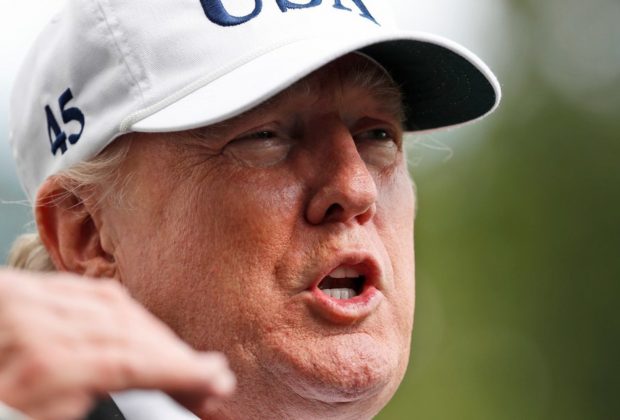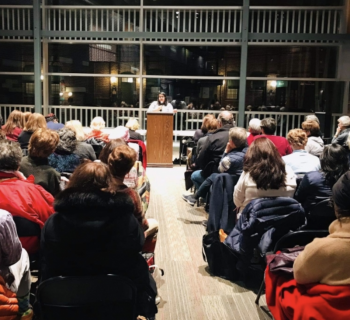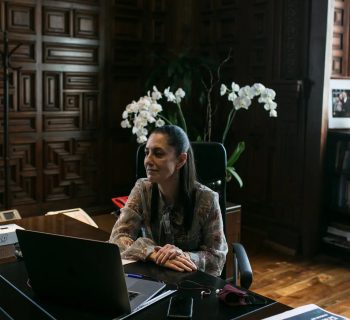WASHINGTON — An unexpected meeting of the minds between President Trump and Democratic leaders on Thursday made real a possible deal in Congress to pair enhanced border security with legislation to protect young, undocumented immigrants brought to the country as children.
One day after Mr. Trump hosted Senator Chuck Schumer and Representative Nancy Pelosi for dinner at the White House, the president said he could support legislation to protect the young immigrants known as “Dreamers” from deportation if it were accompanied by a “massive” border security upgrade. Acceding to a key Democratic demand, Mr. Trump said such a package did not need to have funding for a border wall.
It was the second time this month that a tentative agreement announced by Democrats left Republican leaders in Congress scrambling to adjust a legislative agenda that appears increasingly set by the party out of power in the House, the Senate and the White House.
“We’re working on a plan for DACA,” Mr. Trump told reporters, referring to protections for the Deferred Action for Childhood Arrivals program, as he prepared to leave the White House for Florida. He added, “The wall will come later.”
And Republican leaders at least sounded open to pursuing it.
“We’re not going to bring a solution to the floor that does not have the support of President Trump,” Speaker Paul D. Ryan of Wisconsin told reporters. But if Mr. Trump does support an immigration package that includes “security and enforcement,” he said, so will “a majority of our members, because our members support President Trump.”
But he also made his frustration clear. “The president understands he has to work with the congressional majorities to get any kind of legislative solution,” Mr. Ryan said.
Mr. Trump’s comments, at a time when Republicans had hoped to focus on rewriting the tax code, came amid a chaotic day of back and forth on Capitol Hill over what, precisely, had emerged from Wednesday’s White House dinner — and where Mr. Trump’s newfound alliance with Democrats might lead. On Thursday morning, the president telephoned Republican leaders to relay news of the dinner discussions; Republicans were left on the defensive, and seemingly flummoxed.
Senator Mitch McConnell of Kentucky, the majority leader, issued a curt statement saying he and his colleagues “look forward to receiving the Trump administration’s legislative proposal,” while Mr. Ryan called Wednesday night’s talks “a discussion, not an agreement or a negotiation.”
Leaving the issue in Mr. Trump’s hands could prove beneficial for Republicans, ridding them of a difficult job. A person familiar with the discussions said Mr. McConnell welcomed Mr. Trump being the Republicans’ point man on immigration after the two presidents before him failed to come up with a plan and the party remained split on how to deal with the issue.
Some Republican lawmakers openly welcomed Washington’s newly changed immigration landscape.
“I think President Trump has a chance to be on immigration what President Nixon was on China; he has a lot of credibility on the issue,” said Senator Lamar Alexander, Republican of Tennessee. “I think if the president recommended a solution to Congress and the American people, they might very well accept it.”
However, many Republican lawmakers fear that Mr. Trump, who has not had a background in crafting legislation, might end up signing legislation written by Democrats, which would infuriate many conservative voters. Some conservatives pushed back hard.
Representative Dave Brat, a Virginia Republican and member of the hard-line House Freedom Caucus, said a wall on the southern border was “what the whole election was about.” He added that any bill that offers legal status to undocumented immigrants would send the wrong message.
“You say to the rest of the world, ‘Hey, as long as you get into the U.S., the green light is on and eventually you are going to get to stay permanently,’” he said. “That will lead to a huge inflow.”
Senator Lindsey Graham, the South Carolina Republican who has been a consistent advocate of legislation to overhaul the nation’s immigration laws, cheered Mr. Trump on.
“The president is trying to cut a deal that I think would be good for the country as a whole.”
As lawmakers discussed Mr. Trump’s intentions, the House on Thursday actually passed a get-tough measure called the Criminal Alien Gang Member Removal Act, aimed at MS-13 and other immigrant gangs. Critics and immigration rights advocates said the measure would codify racial profiling.
Earlier this month, Mr. Trump announced he would phase out DACA, begun by President Barack Obama, but would give lawmakers six months to come up with something to replace it. The program benefits about 800,000 young immigrants, including those brought to the United States illegally as children, and others who have overstayed their visas.
But at this point, any legislative proposal on the so-called Dreamers may have to come from the minority party — a highly unusual situation in a Congress where Republicans control both legislative chambers, with a Republican in the White House.
In an interview Thursday, Mr. Schumer said he and Ms. Pelosi arrived at Wednesday’s dinner prepared with a specific list of border security items that Democrats could agree to, drawn from Mr. Trump’s own budget request. They included sensors to beef up border monitoring, rebuilding roads along the border, drones and air support for border enforcement.
“I told the president that there’s tremendous distrust in our caucuses, in our constituencies and in the public, and I mentioned a litany of things such as the Muslim ban and Charlottesville,” Mr. Schumer said, referring to the president’s travel ban on immigrants from six Muslim-majority nations, and to Mr. Trump’s equivocal remarks about white supremacists after the violence in Charlottesville, Va.
“And I said for us to get something done we need to establish some trust,” Mr. Schumer added. He said the next step will be for Democratic leadership aides to meet with White House counterparts to “sit down and figure out a border security package that we can all agree on.” That would be paired with the so-called Dream Act, legislation dating back to 2001 that would shield young immigrants from deportation and offer a path to citizenship.
“We’re all going to support the Dream Act and we’re going to push for it to get on the floor soon,” Mr. Schumer said. “That part is agreed to.”
Republicans accused Mr. Schumer of moving the goal posts. DACA offered temporary legal status to young, undocumented immigrants, and allowed them to live and work without fear of deportation. But it was not as expansive as the Dream Act.
In Florida, Mr. Trump said flatly that any package would not offer a path to citizenship, and added that he intended to work with Republicans as well.
“No, we’re not looking at citizenship,” Mr. Trump said. “We’re not looking at amnesty. We’re looking at allowing people to stay here. We’re working with everybody — Republican. We’re working with Democrat. I just spoke with Paul Ryan, he’s on board. Everybody is on board. They want to do something. We’re not talking about amnesty. We’re talking about — we’re talking about taking care of people, people that were brought here, people that have done a good job and were not brought here of their own volition.”
In an unscripted moment on the Senate floor Thursday, Mr. Schumer was caught on a microphone sounding enthusiastic about the Democrats’ new comity with Mr. Trump. “He likes us; he likes me anyway,” the Democratic leader was overheard saying. He went on: “Here’s what I told him, I said, ‘Mr. President, you’re much better off if you sometimes step right and you sometimes step left. If you have to step just in one direction, you’re boxed.’ He gets that.”
But while Mr. Schumer and Ms. Pelosi were reveling in their seemingly newfound clout, they faced misgivings from their left and from Hispanics, who worry that the fate of young immigrants is now paired with a push for increased border security.
“Why are we discussing border security?” asked Representative Luis V. Gutiérrez, Democrat of Illinois. “I thought we were discussing DACA. So already you see the slippery slope of the conversation.’’
He added, “I hope and pray that Pelosi and Schumer are more sophisticated and smarter than everyone else that’s been duped by Donald Trump.”
Representative Michelle Lujan Grisham, Democrat of New Mexico and chairwoman of the Congressional Hispanic Caucus, said she along with the heads of the Congressional Black Caucus and Congressional Asian Pacific American Caucus met with Mr. Schumer on Thursday afternoon to discuss the agreement.
Ms. Grisham said she would be in favor of a legislative fix that would split the issues of border security and the DACA beneficiaries into two separate bills.
Source: New York Times







